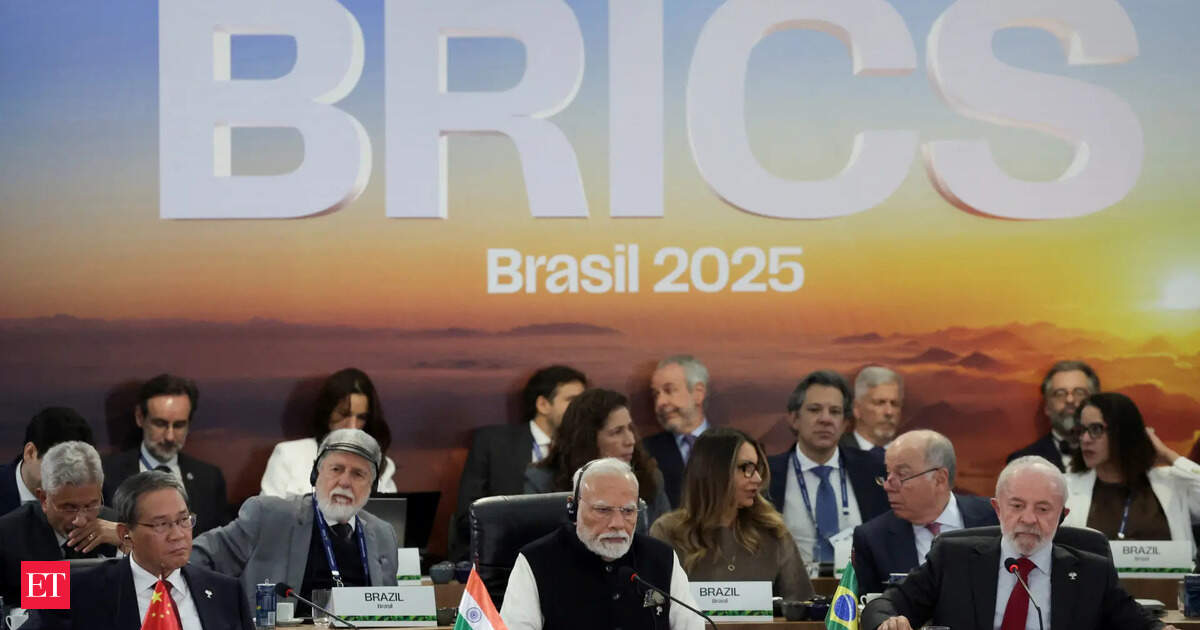If there’s one thing that almost all of them have in common, however, it’s that they want to ensure the grouping’s most powerful member, China, doesn’t dominate. Beijing might want to use its influence over global trade to increase the use of the yuan; but India has made it clear that replacing the US dollar as the global reserve currency isn’t part of the BRICS’ mandate. Some of the newer members, such as the UAE, are close US allies.
Also Read: Trump intensifies tariff threats for copper, chips, drugs & BRICS (including India)
Of course, US policy isn’t universally popular, either. When is it ever? At the BRICS meeting this week in Brazil, leaders jointly condemned the “indiscriminate rising of tariffs,” in a swipe at US President Donald Trump’s trade policy. But Trump was not criticized half as harshly as the Europeans were: Their carbon border taxes were described as “unilateral, punitive and discriminatory protectionist measures that are not in line with international law.”
Partly that’s because the Global South is divided on tariffs, just as it is on everything else. Yes, it might be unfair that poorer countries are losing market access to richer ones — that’s a violation of normal economic logic, in which the poor sell to the rich and everyone’s better off as a result. But most in the developing world might well welcome tariffs on China; they agree its stranglehold on global manufacturing must somehow be loosened. They’re saying: We’re not going to condemn US tariffs targeted at China as strongly as we do European barriers, because doing so would mean playing Beijing’s game.
Also Read: Trump vs BRICS: POTUS is often at odds with the Global South bloc
The only thing that could push these diverse nations together is if the US makes a real effort to present itself to them as a shared target. Unfortunately, that’s exactly what Trump apparently wants to do. He responded to the Rio summit by threatening an extra 10% tariff on “any country aligning themselves with the Anti-American policies of BRICS.”
That plays into China’s hands. Nothing would strengthen Beijing’s case to lead the emerging world more than US efforts to paint a basically innocuous, ineffectual grouping as “anti-American.”
India’s prime minister, Narendra Modi, certainly wouldn’t participate in a summit that was designed to be anti-American. If anything, India’s participation in the BRICS is meant to highlight its own bid for leadership of the Global South — or, at least, its determined attempt to deny that position to Beijing.
On his way to Rio, Modi stopped off in multiple developing countries — Namibia, Ghana, Trinidad and Argentina. It’s an interesting group, one that clarifies India’s Global South strategy. The diaspora is one quiver in Modi’s bow: People of Indian descent are the largest ethnic group in Trinidad and Tobago. India’s hunger for commodities is another component — imports of cooking oil from Argentina have soared since Ukrainian sunflower oil was taken off the market by Russia’s invasion in 2022. Ghana exports more to gold-mad India than anywhere else. And the global race to access the raw materials of the future is part of it as well. Indian companies have been pushed to find ways to process lithium and other critical minerals in Argentina and Namibia.
It’s just not possible for India to immediately substitute for China — or anyone else — as an economic partner in most parts of the world. But a strategy that’s more concentrated geographically and focused on sectors like critical minerals and agri-processing might work, particularly because India’s private sector-driven economic model is far more inclusive and open to local value creation than China’s approach.
The real lesson of the Rio BRICS summit, and Modi’s meandering journey to it, is that it isn’t meant to be a forum for the Global South to be anti-American. It’s better understood as a place where countries bid to lead the Global South. Not all those propositions are designed around diminishing the US role in the world. Such competition is healthy, for the West as well as the South. Trump shouldn’t push a group so distrustful of each other into forming a common cause instead. Instead, make some friends, and keep them — or China will steal them from you.

